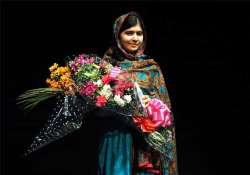Is the Nobel peace prize a message for terrorists, hardliners?
Washington: As the world feted India's Kailash Satyarthi and Pakistan's Malala Yousufzai on winning the Nobel peace prize, some analysts called it a message to terrorists while others feared it could backfire.Calling the two "South

Washington: As the world feted India's Kailash Satyarthi and Pakistan's Malala Yousufzai on winning the Nobel peace prize, some analysts called it a message to terrorists while others feared it could backfire.
Calling the two "South Asia's Peace Heroes," Alyssa Ayres, a senior fellow at the Council on Foreign Relations, thought the Nobel committee clearly "views the hard work of education and children's rights as vital components in making South Asia a more peaceful place."
But noting "a long history of India-Pakistan civil society collaboration to try to overcome tensions in the region, she wrote: "the Nobel Committee's message isn't for those already seized with the importance of normalizing India-Pakistan relations."
"It's for those who would prevent better ties from ever developing between India and Pakistan, and who work to disrupt peace efforts when they are underway," Ayers wrote.
"It's for known terrorists like Al Qaeda and the Taliban, Lashkar-e-Taiba, the Haqqani Network, and myriad others."
"These groups, despite UN sanctions and sanctions under applicable US laws, remain at large in Pakistan, and particularly in the case of Lashkar-e-Taiba founder Hafiz Saeed, who regularly holds public rallies against India and the United States," she noted.
"It's these groups whose continued existence creates the ever-present threat of another attack on India, casting a shadow over every effort to try to make peace," Ayers wrote.
But writing in Foreign Policy, Elias Groll wondered "Will Malala's Nobel Prize Backfire?" even as he viewed Yousafzai and Satyarthi's joint selection as "an obvious nod towards the ongoing global efforts" to end long-standing India-Pakistan conflict.
"For Satyarthi, the award brings recognition to decades of work on behalf of child labourers, but for Yousafzai, the prize arguably comes with risks," he wrote.
Noting that "In some quarters of Pakistan, Yousafzai has become a symbol of Western interference in the country," Groll wrote that "huge international profile does not necessarily translate into change on the ground in Pakistan."
"If anything, those in Pakistan who are hostile toward Yousafzai may only harden in their opposition now that she has received the Peace Prize. That may set her work back more than it advances her cause," he wrote.
The influential New York Times noted "Reaching across gulfs of age, gender, faith, nationality and even international celebrity," the Nobel Committee had "joined a teenage Pakistani known around the world with an Indian veteran of campaigns to end child labour."
The Washington Post also suggested the Nobel Committee "had renewed attention on one of the world's most durable and dangerous standoffs by splitting its annual peace prize between a teenage Pakistani activist and a greying Indian Gandhian."
"The richly symbolic selection brings together individuals who took very different paths to the award, but who hold much in common in their outspoken advocacy for the rights of children," it wrote.
"The pick also reaches across ethnic, religious and political lines to kindle new hopes for peace on the South Asian subcontinent," the Post wrote noting "a tense showdown" between India and Pakistan "has featured four major wars over 67 years."